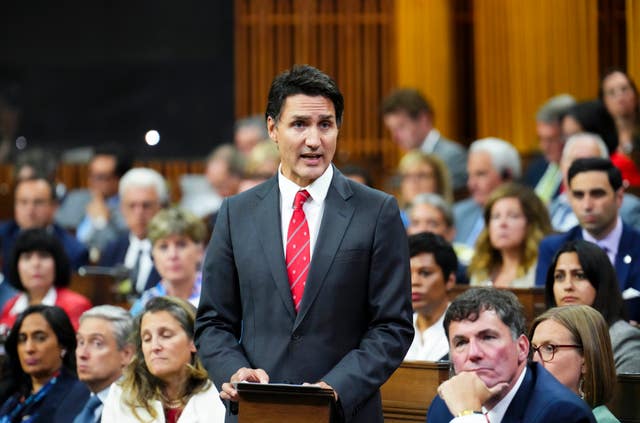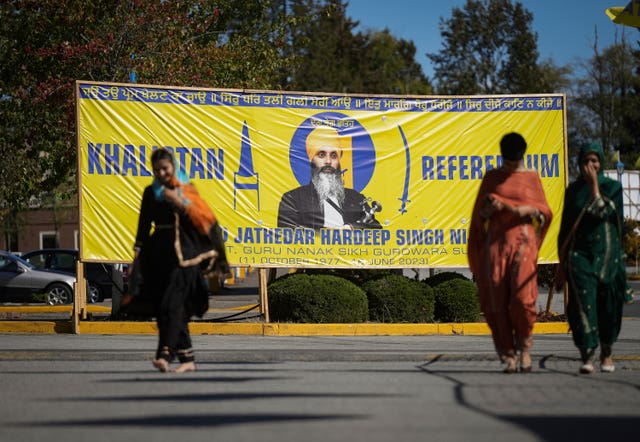India has expelled a senior Canadian diplomat after dismissing allegations its government was linked to the killing of a Sikh activist in Canada.
It comes a day after Canada expelled a top Indian diplomat as it investigates what Prime Minister Justin Trudeau called credible allegations its government may have had links to the assassination of Sikh leader Hardeep Singh Nijjar, who was shot on June 18 outside a Sikh cultural centre in Surrey, British Columbia.
Mr Nijjar was organising an unofficial referendum in India for an independent Sikh nation at the time of his death.
Indian authorities announced a cash reward last year for information leading to Mr Nijjar’s arrest, accusing him of involvement in an alleged attack on a Hindu priest in India.
In a statement, India’s ministry of external affairs said “the decision reflects Government of India’s growing concern at the interference of Canadian diplomats in our internal matters and their involvement in anti-India activities”.

The duelling expulsions come as relations between Canada and India are tense.
Trade talks have been derailed and Canada just cancelled a trade mission to India which was planned for the autumn. Protests by pro-Sikh independence groups in Canada have angered Prime Minister Narendra Modi’s government.
The Sikh independence – or Khalistan – movement is banned in India, where officials see it and affiliated groups as a national security threat.
But the movement still has some support in northern India, as well as countries like Canada and the United Kingdom, which are home to a sizeable Sikh diaspora.
Mr Trudeau told Parliament he brought up the slaying with Mr Modi at the G20 last week.
He said he told Mr Modi that any Indian government involvement would be unacceptable and asked for co-operation in the investigation.
He said: “Any involvement of a foreign government in the killing of a Canadian citizen on Canadian soil is an unacceptable violation of our sovereignty.

“In the strongest possible terms I continue to urge the government of India to co-operate with Canada to get to the bottom of this matter.”
On Tuesday, India’s foreign ministry released a statement dismissing the allegation as “absurd and motivated”.
The ministry said Mr Trudeau had made similar allegations to Mr Modi.
“Such unsubstantiated allegations seek to shift the focus from Khalistani terrorists and extremists, who have been provided shelter in Canada and continue to threaten India’s sovereignty and territorial integrity,” the statement noted, referring to the proposed name of a Sikh homeland.
Canadian foreign minister Melanie Joly said a top diplomat, who she said was the head of Indian intelligence in Canada, has been expelled as a consequence.
“If proven true, this would be a great violation of our sovereignty and of the most basic rule of how countries deal with each other,” Ms Joly said.
“As a consequence, we have expelled a top Indian diplomat.”
Mr Modi expressed “strong concerns” over Canada’s handling of the Punjabi independence movement among the overseas Sikhs during a meeting with Mr Trudeau at the G20, according to India’s response.
The statement described the Sikh movement as “promoting secessionism and inciting violence” against Indian diplomats. It called on Canada to work with India on what New Delhi said is a threat to the Canadian Indian diaspora.
Protests by pro-Khalistan groups in Canada have angered Mr Modi’s government, prompting it to summon the Canadian high commissioner in New Delhi in March.
Canada has a Sikh population of more than 770,000, or about 2% of its total population.

Public safety minister Dominic LeBlanc said Canada’s national security adviser and the head of Canada’s spy service have travelled to India to meet their counterparts and to confront the Indian intelligence agencies with the allegations.
He called it an active murder investigation led by the royal Canadian mounted police.
Ms Joly said Mr Trudeau also raised the matter with US President Joe Biden and UK Prime Minister Rishi Sunak.
“We are deeply concerned about the allegations referenced by Prime Minister Trudeau,” White House National Security Council spokesperson Adrienne Watson said.
“We remain in regular contact with our Canadian partners. It is critical that Canada’s investigation proceed and the perpetrators be brought to justice.”
Ms Joly also said she would raise the issue with her peers in the G7 on Monday evening in New York City ahead of the United Nations General Assembly.
Canadian opposition New Democrat leader Jagmeet Singh, who is Sikh, called it outrageous and shocking.
Mr Singh said he grew up hearing stories that challenging India’s record on human rights might prevent you from getting a visa to travel there.
“But to hear the Prime Minister of Canada corroborate a potential link between a murder of a Canadian citizen on Canadian soil by a foreign government is something I could never have imagined,” he said.
British Columbia Premier David Eby said he received a briefing from Canada’s spy agency about the “assassination” of Mr Nijjar and is “deeply disturbed” by what he was told.
The World Sikh Organisation of Canada called Mr Nijjar an outspoken supporter of Khalistan who “often led peaceful protests against the violation of human rights actively taking place in India and in support of Khalistan”.
“Nijjar had publicly spoken of the threat to his life for months and said that he was targeted by Indian intelligence agencies,” the statement said.
Mr Nijjar’s New York-based lawyer, Gurpatwant Singh Pannun, said Mr Nijjar was warned by Canadian intelligence officials about being targeted for assassination by “mercenaries” before he was shot.
Janice Stein, a political scientist and international relations expert at the University of Toronto, said to kill a Canadian citizen on Canadian soil is astounding.
“It’s tragic for Canada because we have issues of foreign interference with the two largest economies in Asia, China and India. And we have two very large diaspora from both countries. This is not what we want,” Ms Stein said.
Indian authorities have targeted Sikh separatism since the 1980s, when an armed insurgency for an independent Sikh state took off in Punjab state.
In 1984, Indian forces stormed the Golden Temple in the state’s Amritsar city to flush out Sikh separatists, who had taken refuge there. The controversial operation killed around 400, according to official figures, although Sikh groups estimate the toll to be higher.
The prime minister who ordered the raid, Indira Gandhi, was killed after by two of her bodyguards, who were Sikh. Her death triggered a series of anti-Sikh riots, in which Hindu mobs went from house to house across northern India, pulling Sikhs from their homes, hacking many to death and burning others alive.
Mr Modi’s government has intensified the pursuit of Sikh separatists. When farmers camped out on the edges of New Delhi to protest agriculture laws in 2021, Mr Modi’s government initially tried to discredit Sikh participants by dismissing their concerns by calling them “Khalistanis”.
Police also arrested a 22-year-old climate activist for supporting the farmers and accused her of being in touch with Sikh independence supporters.
Earlier this year, supporters of the Khalistan movement vandalised Indian consulates in London and San Francisco.
In April, Indian police arrested a leader who had become popular for speeches that called for an independent Sikh homeland after a month-long hunt.




Why are you making commenting on The Herald only available to subscribers?
It should have been a safe space for informed debate, somewhere for readers to discuss issues around the biggest stories of the day, but all too often the below the line comments on most websites have become bogged down by off-topic discussions and abuse.
heraldscotland.com is tackling this problem by allowing only subscribers to comment.
We are doing this to improve the experience for our loyal readers and we believe it will reduce the ability of trolls and troublemakers, who occasionally find their way onto our site, to abuse our journalists and readers. We also hope it will help the comments section fulfil its promise as a part of Scotland's conversation with itself.
We are lucky at The Herald. We are read by an informed, educated readership who can add their knowledge and insights to our stories.
That is invaluable.
We are making the subscriber-only change to support our valued readers, who tell us they don't want the site cluttered up with irrelevant comments, untruths and abuse.
In the past, the journalist’s job was to collect and distribute information to the audience. Technology means that readers can shape a discussion. We look forward to hearing from you on heraldscotland.com
Comments & Moderation
Readers’ comments: You are personally liable for the content of any comments you upload to this website, so please act responsibly. We do not pre-moderate or monitor readers’ comments appearing on our websites, but we do post-moderate in response to complaints we receive or otherwise when a potential problem comes to our attention. You can make a complaint by using the ‘report this post’ link . We may then apply our discretion under the user terms to amend or delete comments.
Post moderation is undertaken full-time 9am-6pm on weekdays, and on a part-time basis outwith those hours.
Read the rules here